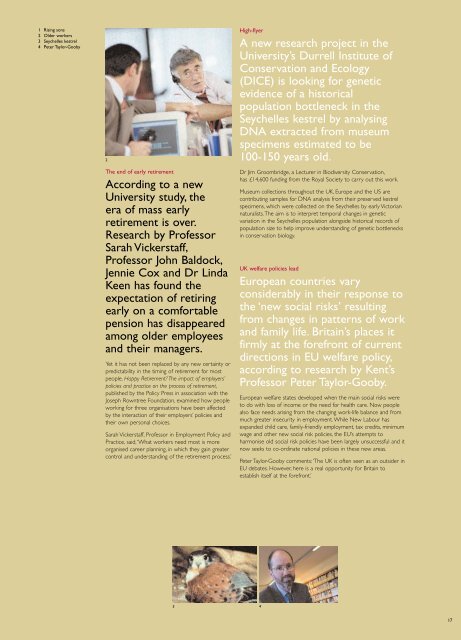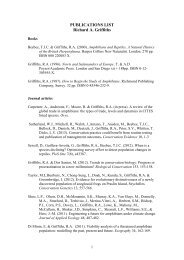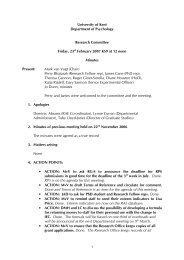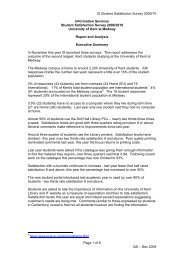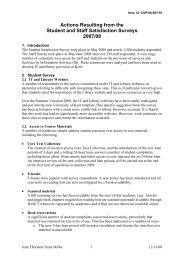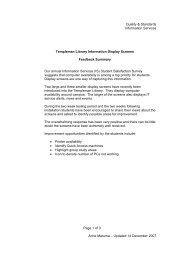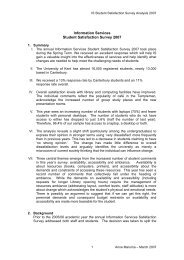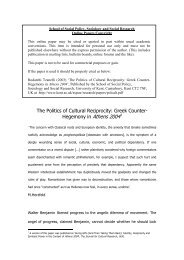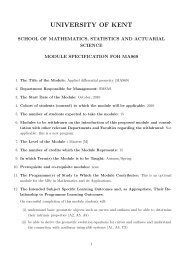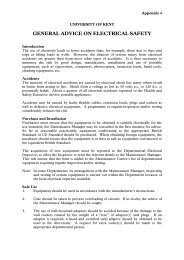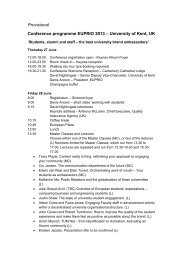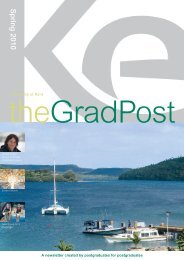KENT MAGAZINE AW - University of Kent
KENT MAGAZINE AW - University of Kent
KENT MAGAZINE AW - University of Kent
You also want an ePaper? Increase the reach of your titles
YUMPU automatically turns print PDFs into web optimized ePapers that Google loves.
1 Rising sons<br />
2 Older workers<br />
3 Seychelles kestrel<br />
4 Peter Taylor-Gooby<br />
2<br />
The end <strong>of</strong> early retirement<br />
According to a new<br />
<strong>University</strong> study, the<br />
era <strong>of</strong> mass early<br />
retirement is over.<br />
Research by Pr<strong>of</strong>essor<br />
Sarah Vickerstaff,<br />
Pr<strong>of</strong>essor John Baldock,<br />
Jennie Cox and Dr Linda<br />
Keen has found the<br />
expectation <strong>of</strong> retiring<br />
early on a comfortable<br />
pension has disappeared<br />
among older employees<br />
and their managers.<br />
Yet it has not been replaced by any new certainty or<br />
predictability in the timing <strong>of</strong> retirement for most<br />
people. Happy Retirement? The impact <strong>of</strong> employers’<br />
policies and practice on the process <strong>of</strong> retirement,<br />
published by the Policy Press in association with the<br />
Joseph Rowntree Foundation, examined how people<br />
working for three organisations have been affected<br />
by the interaction <strong>of</strong> their employers’ policies and<br />
their own personal choices.<br />
Sarah Vickerstaff, Pr<strong>of</strong>essor in Employment Policy and<br />
Practice, said, ‘What workers need most is more<br />
organised career planning, in which they gain greater<br />
control and understanding <strong>of</strong> the retirement process.’<br />
High-flyer<br />
A new research project in the<br />
<strong>University</strong>’s Durrell Institute <strong>of</strong><br />
Conservation and Ecology<br />
(DICE) is looking for genetic<br />
evidence <strong>of</strong> a historical<br />
population bottleneck in the<br />
Seychelles kestrel by analysing<br />
DNA extracted from museum<br />
specimens estimated to be<br />
100-150 years old.<br />
Dr Jim Groombridge, a Lecturer in Biodiversity Conservation,<br />
has £14,600 funding from the Royal Society to carry out this work.<br />
Museum collections throughout the UK, Europe and the US are<br />
contributing samples for DNA analysis from their preserved kestrel<br />
specimens, which were collected on the Seychelles by early Victorian<br />
naturalists.The aim is to interpret temporal changes in genetic<br />
variation in the Seychelles population alongside historical records <strong>of</strong><br />
population size to help improve understanding <strong>of</strong> genetic bottlenecks<br />
in conservation biology.<br />
UK welfare policies lead<br />
European countries vary<br />
considerably in their response to<br />
the ‘new social risks’ resulting<br />
from changes in patterns <strong>of</strong> work<br />
and family life. Britain’s places it<br />
firmly at the forefront <strong>of</strong> current<br />
directions in EU welfare policy,<br />
according to research by <strong>Kent</strong>’s<br />
Pr<strong>of</strong>essor Peter Taylor-Gooby.<br />
European welfare states developed when the main social risks were<br />
to do with loss <strong>of</strong> income or the need for health care. Now people<br />
also face needs arising from the changing work-life balance and from<br />
much greater insecurity in employment. While New Labour has<br />
expanded child care, family-friendly employment, tax credits, minimum<br />
wage and other new social risk policies, the EU’s attempts to<br />
harmonise old social risk policies have been largely unsuccessful and it<br />
now seeks to co-ordinate national policies in these new areas.<br />
Peter Taylor-Gooby comments: ‘The UK is <strong>of</strong>ten seen as an outsider in<br />
EU debates. However, here is a real opportunity for Britain to<br />
establish itself at the forefront.’<br />
3 4<br />
17


